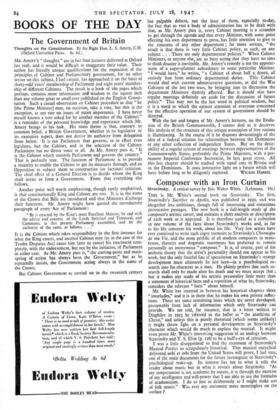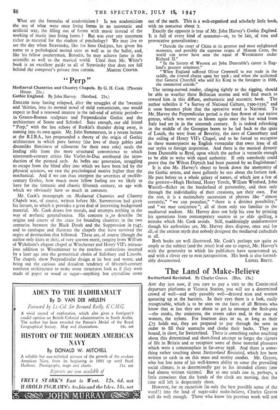Composer with an Iron Curtain
Stravinsky. A critical survey by Eric Walter White. (Lehmann. 15s.)
TILIS is Mr. White's second book on Stravinsky. The first, Stravinsky's Sacrifice to Apollo, was published in 1930, and was altogether less ambitious, though full of interesting and sometimes provocative passages. The new book is a full-length study of the composer's artistic career, and contains a short analysis or description of each work as it appeared. It is therefore useful as a collection in one volume of the facts about Stravinsky's works and, as far as his life concerns his work, about his life. Very few artists have ever contrived to write such cagey memoirs as Stravinsky's Chronique de ma Vie, and the most prolific of all modern composers in mani- festos, theories and dogmatic statements has preferred to remain personally an anonymous " composer." It is, of course, part of his aesthetic theory that the artist's personality should not appear in his work, but the only fruitful line of speculation on Stravinsky's strange development must ultimately lie just here—in a psychological re- search into his character as a man. He plainly prefers that such re- search shall only be made after his death and we must accept that ; but it makes any study of his artistic personality little more than a statement of historical facts and a repetition of what he, Stravinsky, considers the relevant " facts " about himself.
Mr. White has inserted in between his historical chapters three " interludes," and it is in them that he makes his own private reflec- tions. There are some tantalising hints which are never developed, presumably from lack of information which only Stravinsky can provide. We are told, for instance, that in a letter written to Diaghilev in 1923 he referred to the ballet- as " the anathema of Christ," and unless this is purely rhetorical (which seems unlikely) it might throw fight on a personal development in Stravinsky's character which would do much to explain the musical. It might even prove Mr. White's interesting suggestion' f an analogy between Stravinsky and T. S. Eliot (p. 126) to be a bull's-eye of criticism.
I was a little disappointed to find the treatment of Stravinsky's Musical Poetics so scrupulously historical. This musical encyclical delivered urbi et orbi from the United States will prove, I feel sure, one of the main dqcuments for the future investigator of Stravinsky's psychological make-up. Its interest lies not in what it tells the reader about music but in what it reveals about Stravinsky. "As my temperament is not academic by nature, it is through the exercise of my intelligence and will-power that I am able to use the formulas of academicism. I do so just as deliberately as I might make use of folk music." Was ever any statement more meaningless on the surface ?
What are the formulas of academicism ? Is not academicism the use of what were once living forms in an automatic and artificial way, the filling out of forms with music instead of the working of music into living forms ? But was ever any statement richer in material for the student of psychology? We may live to see the day when Stravinsky, like his hero Oedipus, has given his name to a pathological mental state as well as to the ballet, and, like his fellow countryman, Borodin, he may achieve fame in the scientific as well as. the musical world. Until then Mr. White's book is an excellent guide to all of Stravinsky that does not fall
behind the composer's private iron curtain. MARTIN COOPER.



































 Previous page
Previous page